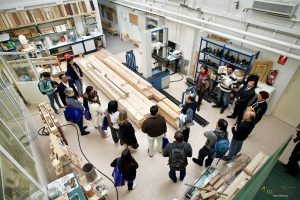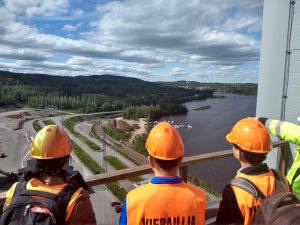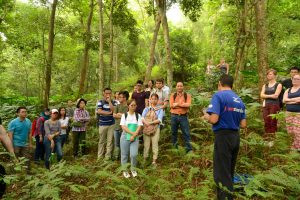INTRODUCTION
 The origins of the University of Valladolid (UVa) date from the thirteenth century. Since then the UVa has grown and adapted to the times to become one of the most important universities in Spain. It offers 80 undergraduate degree courses in the fields of humanities, social, health and natural physical sciences and engineering. In its classrooms the more traditional studies live side by side with newer disciplines that respond to the technological needs of the immediate future. Moreover, the UVA offers 68 master and 29 Ph.D. programmes in the above-mentioned areas of study. These study programmes are designed in intensive co-operation with enterprises and other relevant stakeholders. On average, nearly 24,000 students enroll each year; in the academic year 2015/2016, 460 Ph.D. thesis were defended at the UVa. It has more than 2,600 teachers and nearly 1,000 people dealing with administration tasks and other services. Over 60% of students do internships in companies and other institutions. Internationalization is one of the key objectives of the UVa. Therefore, the IRO has been organising student and academic staff mobility since 1987 within the framework of ERASMUS and other European Programmes. The UVa has been active in the ERASMUS MUNDUS Programme, having coordinated 3 Projects and participated in 11 Projects as a Partner. It is currently taking an active part in ERASMUS + Key Action 1 with over 2.000 students and 200 professors sent and received to and from European universities as well as Programme Country Universities. The UVa is also participating in several Key Action 2 projects as a partner. The UVA manages around 852 research projects financed through competitive public R+D+i calls & approximately 500 contracts and agreements aimed at the transfer of knowledge and technology around 15 millions €/year) Moreover, its researchers take part in almost 250 further projects and contracts managed by other institutions. In the field of forestry, UVa is one of the learders universities in South Europe with projects at both national and international level including Research and Network actions and academic exchanges with European, African, South Est Asia and America (USA & Latinamerica)
The origins of the University of Valladolid (UVa) date from the thirteenth century. Since then the UVa has grown and adapted to the times to become one of the most important universities in Spain. It offers 80 undergraduate degree courses in the fields of humanities, social, health and natural physical sciences and engineering. In its classrooms the more traditional studies live side by side with newer disciplines that respond to the technological needs of the immediate future. Moreover, the UVA offers 68 master and 29 Ph.D. programmes in the above-mentioned areas of study. These study programmes are designed in intensive co-operation with enterprises and other relevant stakeholders. On average, nearly 24,000 students enroll each year; in the academic year 2015/2016, 460 Ph.D. thesis were defended at the UVa. It has more than 2,600 teachers and nearly 1,000 people dealing with administration tasks and other services. Over 60% of students do internships in companies and other institutions. Internationalization is one of the key objectives of the UVa. Therefore, the IRO has been organising student and academic staff mobility since 1987 within the framework of ERASMUS and other European Programmes. The UVa has been active in the ERASMUS MUNDUS Programme, having coordinated 3 Projects and participated in 11 Projects as a Partner. It is currently taking an active part in ERASMUS + Key Action 1 with over 2.000 students and 200 professors sent and received to and from European universities as well as Programme Country Universities. The UVa is also participating in several Key Action 2 projects as a partner. The UVA manages around 852 research projects financed through competitive public R+D+i calls & approximately 500 contracts and agreements aimed at the transfer of knowledge and technology around 15 millions €/year) Moreover, its researchers take part in almost 250 further projects and contracts managed by other institutions. In the field of forestry, UVa is one of the learders universities in South Europe with projects at both national and international level including Research and Network actions and academic exchanges with European, African, South Est Asia and America (USA & Latinamerica)

FIRST YEAR
Students are going to take 60 ECTS in the University of Valladolid – Spain (UVa) during the first year learning about sustainable forest management and introductory courses of Green chemistry or Nature Based Solutions to introduce specialization topics (40 ECTS).

Moreover, UVa will be responsible for design, supervision and coordination of two internships:
- Boreal Intensive Learning Period in the South-Eastern Finland University of Applied Sciences (XAMK) (10 ECTS).
 This ILP allows students to learn forestry in boreal conditions, entrepreneurship and opportunities for service production in bioeconomy. The forest cluster is the foundation of the Finnish bioeconomy. Over seventy per cent of land area is covered by forest, and it is managed according to economic, social and ecological dimensions of sustainability. In addition to forestry and forest industry, forestry cluster includes e.g. forestry services, machinery, logistics and bioenergy. Strong collaboration between a strong forest sector and forest education makes Xamk a true and important partner in bioeconomy-related higher education. The Master degree “Business Operations in Forestry” implemented in Xamk is focused on working life needs, e.g. students must have 2 years of relevant working experience in the field of forestry before attendance. Xamk will contribute to the project by improving the competences and skills of Master graduates in globally important boreal forestry together with strong working-life related education.
This ILP allows students to learn forestry in boreal conditions, entrepreneurship and opportunities for service production in bioeconomy. The forest cluster is the foundation of the Finnish bioeconomy. Over seventy per cent of land area is covered by forest, and it is managed according to economic, social and ecological dimensions of sustainability. In addition to forestry and forest industry, forestry cluster includes e.g. forestry services, machinery, logistics and bioenergy. Strong collaboration between a strong forest sector and forest education makes Xamk a true and important partner in bioeconomy-related higher education. The Master degree “Business Operations in Forestry” implemented in Xamk is focused on working life needs, e.g. students must have 2 years of relevant working experience in the field of forestry before attendance. Xamk will contribute to the project by improving the competences and skills of Master graduates in globally important boreal forestry together with strong working-life related education.
- Tropical intensive learning period in collaboration with the associated partners in tropical countries (Latin America, Africa and Asia) (10 ECTS).
 In the tropical ILP the students will know the bioecological and biogeographic context of tropical forests, the main physiognomic tropical forest formations (evergreen, semi-perennial and deciduous humid, dry deciduous, savannah forest, savannah, shrub savannah, mangroves, bambú, silvopastoral, agrosilvopastoral, conifers, planation forests, etc.), the impacts of Global change on the tropical forests and the societies related to them. The students will understand the specific particularities of tropical forestry, their constraints and the opportunities for tropical forest products bioeconomy, the silvicultural basis for tropical forestry, forest certification as a tool for good practices, the ecosystem services provide for the tropical forests. Through case studies, they will know the wood and non-wood forest products utilization and transformation in the region where the ILP is developed, and innovative experiences in forest based biocoenomy. The tropical ILP is an opportunity to learn the importance of tropical forests for the bioeconomy, thanks to the training on tropical forest and tropical forestry and the assessment of case studies with fieldwork.
In the tropical ILP the students will know the bioecological and biogeographic context of tropical forests, the main physiognomic tropical forest formations (evergreen, semi-perennial and deciduous humid, dry deciduous, savannah forest, savannah, shrub savannah, mangroves, bambú, silvopastoral, agrosilvopastoral, conifers, planation forests, etc.), the impacts of Global change on the tropical forests and the societies related to them. The students will understand the specific particularities of tropical forestry, their constraints and the opportunities for tropical forest products bioeconomy, the silvicultural basis for tropical forestry, forest certification as a tool for good practices, the ecosystem services provide for the tropical forests. Through case studies, they will know the wood and non-wood forest products utilization and transformation in the region where the ILP is developed, and innovative experiences in forest based biocoenomy. The tropical ILP is an opportunity to learn the importance of tropical forests for the bioeconomy, thanks to the training on tropical forest and tropical forestry and the assessment of case studies with fieldwork.
